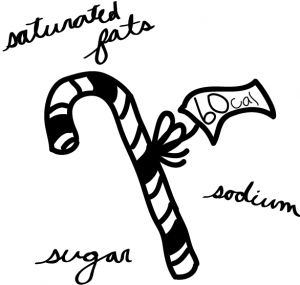
For those of you with a sweet tooth, there’s some bad news coming. New federal guidelines forbid snacks that don’t meet certain health criteria until 30 minutes after the final bell.
So say goodbye to that decadent after-school brownie. And if you’re waiting for an excuse to indulge, don’t anticipate any bake sales right after school.
Certainly health is an increasingly prominent issue in America, but do the negatives of these new restrictions outweigh the benefits? The change was a result of the 2010 Healthy Hunger-Free Kids Act, which was supported by First Lady Michelle Obama’s Let’s Move! initiative.
“[Americans] are now eating 31 percent more calories than we were 40 years ago—including 56 percent more fats and oils, and 14 percent more sugars and sweeteners,” claims the official Let’s Move! website. “The average American now eats fifteen more pounds of sugar a year than in 1970.”
The policy certainly has noble aims. Childhood obesity is linked to a number of health risks, including an increased chance of coronary heart disease, stroke and diabetes, as well as high blood pressure according to the National Institutes of Health.
However, large scale changes, even with good intentions, are rarely without negative consequences.
Healthier snacks make for healthier kids by default, but how can we guarantee that kids eat those snacks? Not to mention, healthier and locally sourced food means higher prices.
According to an email sent by Food and Nutrition Services director Penny McConnell, a survey at Fairfax High school showed that paying lunch participation dropped by an average of about 50 to 100 students daily; the survey pointed at price increase as a probable cause. Who’s to say that students will continue to be willing to purchase healthier snacks, even with the price increase?
The new restrictions will also undoubtedly wreak havoc on fundraising plans. The first few minutes after the final bell, when students crowd in the front lobby, are paramount to bake sale profits.
Not to mention, the beloved holiday tradition of candygrams is out of the question.
Certain items on the menus of Subway, Papa Johns, Pizza Hut and Smart Slice (Domino’s recently launched school lunch program) have been approved for sale, but the limited selection of franchises takes away the homemade novelty of bake sales.
It’s easy enough to point out the negatives, especially since there doesn’t seem to be any short-term merits.
Even with all the downfalls and inconveniences becoming immediately apparent, it’s important to remember that health is a long-term goal.
With the changes being so recent, it’s impossible to draw a conclusion about the program’s effectiveness.
All long-term goals pose their fair share of challenges, and in order to reap the benefits, we just have to stick with them and wait.
Who knows. Maybe we’ll thank them someday.
